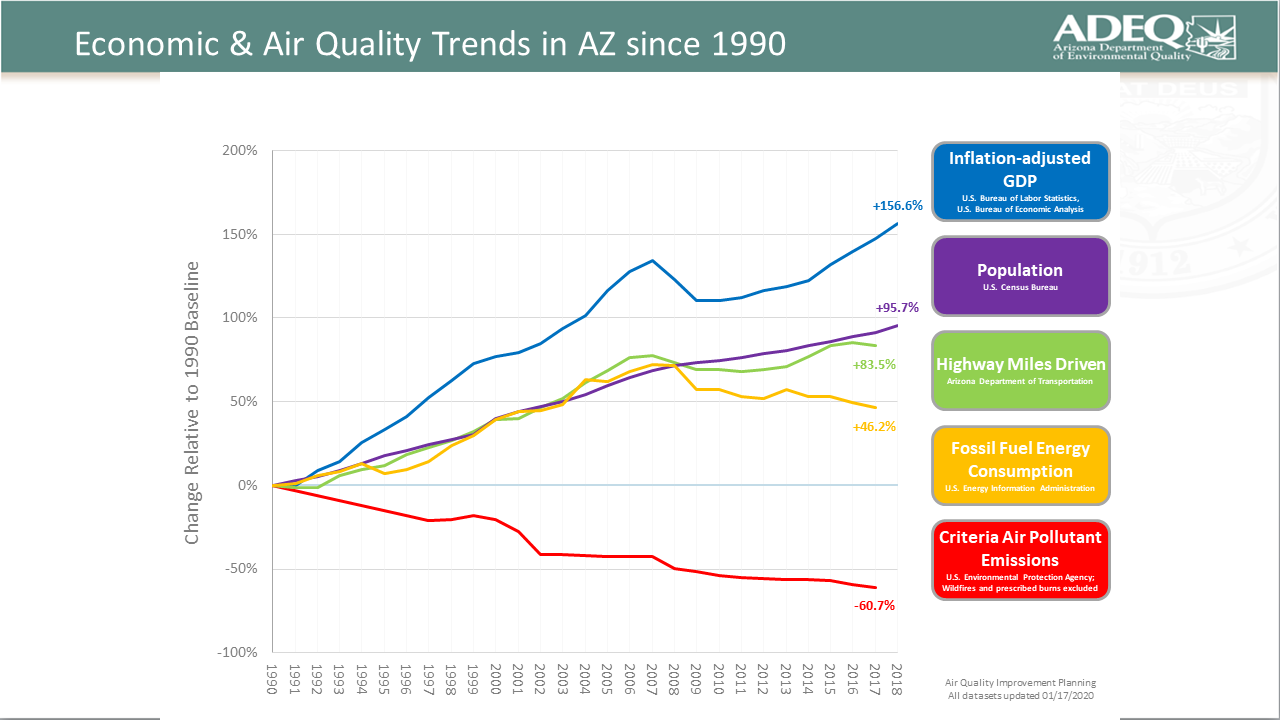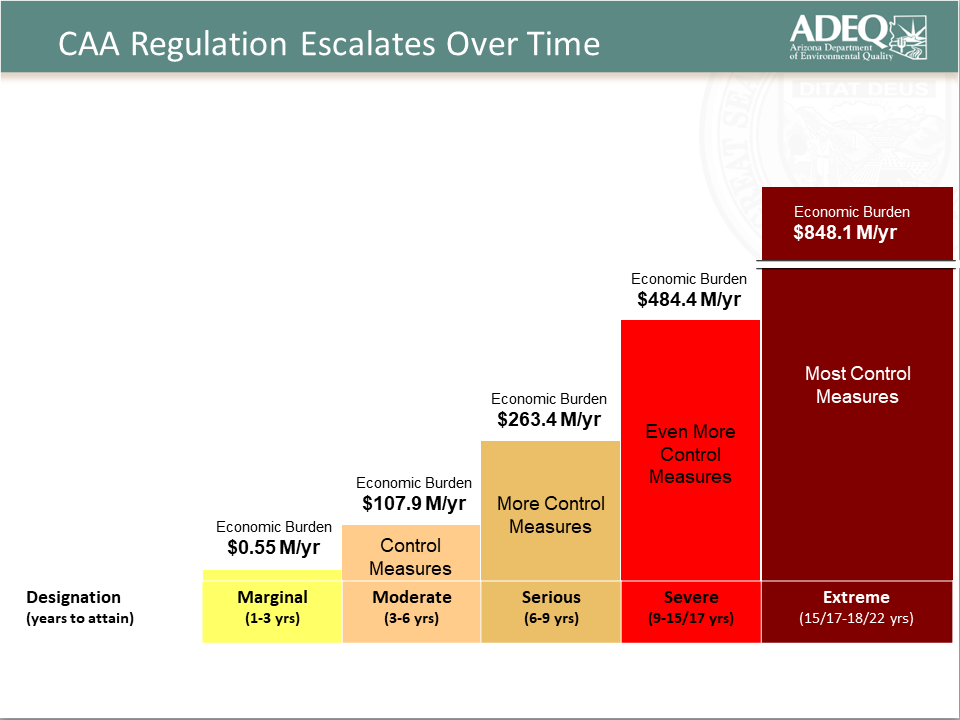Arizona industry could be faced with a $250-million bill for air pollution that is mostly created by everyday drivers in the Phoenix metro region, said the director of the Arizona Department of Environmental Quality (DEQ), Misael Cabrera.
If the region cannot meet more stringent federal air quality standards by 2024, a new layer of costly regulatory controls will kick in. Businesses will pay the bulk, Cabrera said.
Meanwhile, that would do little to clean the air, he said, but it could cause significant harm to local economies.
“It’s not only our health that is at risk. If action is not taken to address problems with an outdated regulatory process, it could have major consequences for businesses and the economy in the region–and the state,” Cabrera said.
DEQ officials are calling on citizens and state lawmakers to help.
 Air quality improving but not enough
Air quality improving but not enough
Air quality in the Phoenix metro area has actually improved in the past decade, even while population figures and GDP have exploded. Since 1990, air quality has improved more than 60 percent due to regulatory controls on industry in the Clean Air Act and better fuel economy for vehicles, according to DEQ data.
Despite that progress, the region is now facing a bump from a “moderate” air quality rating to a “serious” rating if it cannot meet more stringent requirements put in place in 2015.
Industry no longer major air polluter
Today, more than 50 percent of the harmful ozone in the Valley is created from man-made pollution from drivers. Only 8 percent comes from industry, DEQ data shows.
As more cars have jumped on Valley roadways over the past decade, the Phoenix area has been unable to meet the attainment standard of 75 parts per billion (ppb) ozone.
 More regulations will do little to clean air
More regulations will do little to clean air
If the metro Phoenix is bumped up to the “serious” category, it is projected to create a $263 million annual economic burden in added regulatory controls, according to a DEQ analysis submitted to the state Legislature this month. Under the current “moderate” category, the economic burden is $107.9 million.
The added costs would land mostly on industry’s shoulders, Cabrera said. Any expanding or new businesses that would require certain types of air quality permits in the Valley would have to meet stricter regulatory requirements.
More importantly, added controls will do little to improve air quality, he said. Tackling vehicle emissions is the true modern challenge.
“Industry is simply no longer the main source of emissions that contribute to ozone formation,” Cabrera said. “The vast majority of the regulatory tools are directed towards job creating businesses and not towards vehicles.”
Calling on state lawmakers, citizens
To prevent placing an unfair economic burden on businesses, DEQ staff are working with stakeholders to develop a comprehensive mitigation strategy.
The agency also is researching options to improve vehicle emissions testing and assistance for drivers whose vehicles do not meet emissions standards. An air quality omnibus bill, HB 2455, before the state Legislature includes expansion of assistance programs.
Vouchers for electric cars, help with vehicle repairs
DEQ is calling on drivers to make a conscious effort to cut back on driving, particularly during high traffic periods.
A number of DEQ programs offer incentives and tips for drivers to improve air quality including:
- Voluntary Vehicle Repair Program: This program provides financial assistance to owners of eligible vehicles after a failed emissions test. They can receive up to $550 for gasoline vehicles and $1,000 for heavy duty diesel vehicles. Customer vehicles must meet program requirements and customers must co-pay the first $150 toward repairs. Proposed legislation would expand the program to include more perks including waiving the $150 fee. Since 2018, more than 2700 vehicles have been repaired through the program, saving owners more than $1.3 million and eliminating more than 560 tons of emissions.
- Electric Vehicle Project: To help improve air quality in Phoenix and Tucson, ADEQ is collaborating with manufacturers that are providing rebates for the purchase of new electric vehicles. As part of this collaborative effort, Phoenix and Tucson drivers who paid for emissions testing in the last two years may qualify for a rebate up to $3,500 off a new Nissan LEAF. Buyers also may be eligible for a $7,500 federal tax credit.
Gov. Doug Ducey also is stepping up to help with increased funding for DEQ in his proposed fiscal 2021 budget. The money would pay for public awareness projects and expanded vehicle repair assistance programs.
To learn more about voluntary programs and incentives, go to: Air Quality Voluntary Program programs.
For more information on simple steps drivers can take to improve air quality, go to: Five Things you can do to Improve Air Quality.
This story was originally published at Chamber Business News.




